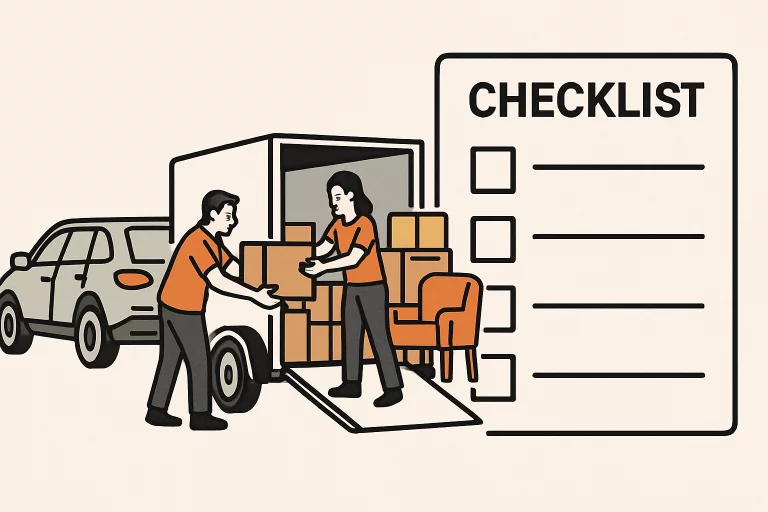
Trailer Rental Tips for DIY Movers
Handling your own move can lead to significant cost savings, greater control over your schedule, and the ability to personalize every detail of the process. One of the most impactful choices you’ll make is selecting the right trailer rental. DIY move success relies on understanding the rental process, safe moving, and stress-reducing planning.
Research and guidance can maximize savings, minimize risk, and ensure safe possessions. Proper planning, including choosing the right trailer, understanding hidden rental expenses, and protecting property, is crucial. These tips provide practical strategies for DIY movers, empowering them to confidently and efficiently move from start to finish.
Choose the Right Trailer
The ideal trailer for a move is not just about size, but also about matching the move’s specific requirements with the right equipment. Enclosed cargo trailers are ideal for fragile items, electronics, or upholstered furniture. In contrast, open utility trailers are suitable for bulkier, weather-resistant items like lawn equipment, truck beds, or rugged furniture.
To choose the right trailer, list all items, measure large furniture pieces, and ensure your towing vehicle has the power, hitch, and braking capacity. Reputable rental companies provide detailed size guides and weight limits, making it easy to compare options. If you’re unsure, renting a slightly larger trailer is safer than overloading, as it prevents damage and safety hazards.
Plan Ahead and Book Early
The moving industry’s busiest season runs from late spring to early fall, a period when most families schedule their moves to avoid school-year disruptions or harsh winter weather. With nearly half of all U.S. relocations happening between Memorial Day and Labor Day, demand for moving trucks and trailers skyrockets. If you wait until the last minute, you might find yourself scrambling for an available trailer or settling for equipment that doesn’t meet your needs.
By booking your rental at least two to four weeks prior to your move, you give yourself the best shot at your desired pick-up date, size, and style. Additionally, many rental providers offer noteworthy savings for early birds, making advanced booking both a practical and budget-friendly choice. You’ll also have more flexibility to adjust details if your schedule changes, allowing you to move on your own terms instead of theirs.

Understand Rental Costs
Trailer rental fees can be complex and include additional charges like per-mile fees, extras like loading ramps, moving blankets, tie-down straps, and dollies. Companies often charge extra for one-way rentals, so clarify the terms if it’s not a round trip. Fuel consumption spikes during towing, so adding extra fuel stops into your budget.
Before signing a contract, ask for a complete itemized bill of fees and read the fine print carefully. Some rental companies provide online calculators for estimating total costs. Set clear expectations and ask questions if anything is unclear, whether dealing with a major chain or a trusted local business, to avoid unexpected charges and stay on budget.
Inspect the Trailer Before Use
Never skip the all-important trailer inspection, no matter how rushed your move may feel. Walk around the entire trailer, looking for any visible signs of damage such as dents, cracked lights, rusted areas, or missing hardware. Examine the tires for adequate tread and inflation—underinflated or worn-out tires are a recipe for road trouble. Test all light signals and brake connections, ensuring the trailer’s electrical system is fully compatible with your vehicle.
Pay close attention to latches, locks, and ramps to confirm that everything secures properly during transit. Use your phone to snap photos or record videos of any issues you spot; these visual records can be invaluable if there is a dispute after drop-off. Ensuring your trailer is in top condition protects your deposit and is essential for a safe trip.
Pack and Load Efficiently
Loading your trailer correctly is crucial for a smooth and safe move. Place heavy items close to the trailer’s axle, ensuring stability and control. Use lightweight items like blankets or pillows to cushion fragile pieces. Secure everything tightly with ratchet straps or bungee cords. Invest in professional packing supplies, such as substantial containers and protective supplies, and clearly label each box by room and contents.
Prioritizing high-importance items and using a clear labeling system can save time and frustration during unloading. Consult the Moving.com guide on packing for a move for expert methods to prevent breakage and make unpacking easier.
Drive Safely with a Trailer
Towing a loaded trailer changes driving dynamics, including speed, stopping distance, and steering. To avoid accidents, stick to slower speeds, increase following distance, take wider turns, and slow down well in advance. Practice maneuvering with the trailer in an empty lot, stay vigilant for sudden crosswinds, and monitor mirrors frequently.
If needed, ask a friend or family member to guide you. Stay calm and focused behind the wheel, as rushing or making impulsive maneuvers can increase the risk of accidents. Safe driving is crucial for protecting both the hauler and others on the road.
Return the Trailer on Time
Meeting your scheduled return time is crucial for keeping your costs in check and maintaining a good reputation with the rental provider. Late returns often come with stiff late fees or could disrupt reservations for other customers—something no one wants during a busy moving season. Many companies offer after-hours drop-off but may require you to take photos of the trailer and return keys via a lockbox or drop slot.
Review these procedures with your rental agent before your move to avoid hiccups during return. By returning on time and in good condition, you not only avoid penalties but also help ensure the next mover can begin their process smoothly.
Consider Insurance Options
Insurance is crucial for DIY moves, especially for rented trailers. It’s essential to check if your auto insurance policy covers rented trailers, as some rental agencies offer short-term insurance policies. These policies cover accidental damage, theft, and third-party liability, providing peace of mind during a hectic move. Investing in insurance is especially beneficial for hauling expensive or irreplaceable items.
Following these trailer rental tips ensures an economical, organized, and secure move. Choosing the right partner and paying attention to detail will lead to a successful new beginning.
